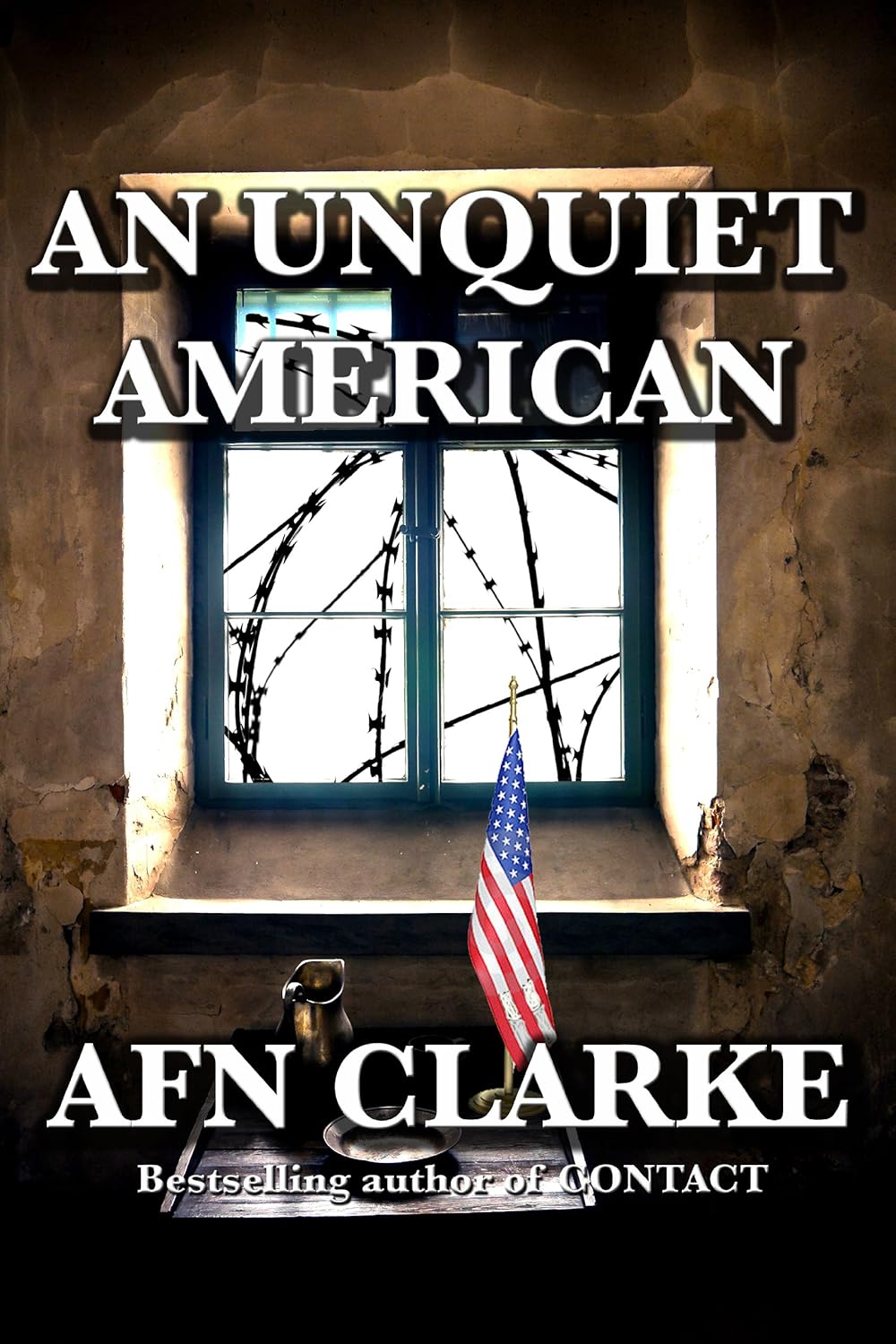DAY 3 – MARCH 2008
FCTIS INTERROGATION CENTRE - ROOM 2
Rufus Reed stared at the light as if trying to assimilate it into his soul. To become the light and block out every other stimulus that had been flirting with his sanity. The after effects of the drug they had given him had finally worn off, leaving a lingering feeling of disconnect with the real world.
‘What difference would it make in the totality of time?’ he thought idly as the light burned deep into his mind, shining onto memories that had long been left in the dark recesses of a life few people would ever know. ‘This is an interesting experience and what matter if I should die as a result? I’ve lived well, loved deeply, fought hard…’ he paused his thinking and sighed. ‘But perhaps I haven’t been the father I should have been.’
Normally he was not given to reminiscing about the past, except perhaps to enhance the quality of his work, because the future always had so much to offer in the excitement of the unknown. Besides, he knew that a few unforgivable mistakes, some bad behavior and two ill-advised marriages, had no redeeming qualities under the harsh light of introspection. ‘Just what kind of ridiculous truth serum did they give me,’ he thought, knowing that the drugs were more successful in novels than in real life. ‘Except that stuff the Russians were supposed to have come up with, Litvinenko called it SP-117 before he was killed by radionuclide polonium-210. And he should have known because he said he used it himself when he was working for the Russian Federal Security Service. Ah well, no matter, my life’s an open book.’ The silly reference to his job as a novelist made him smile as tried to clear his head. He had no memory of anything from the moment he felt the needle in his neck, just glimpses of shadowy figures and the boring murmur of his own voice, until yesterday when he began to emerge from his drugged state.
He tried to remember the events from the time of the attack in Marin to this moment, but only saw ghostly images in his mind as if he was caught in a living dream. ‘Perhaps if I can go with the dream I can piece together the puzzle. Figure out what I said, or didn’t say,’ he thought, rationalizing that fighting the remembered images and trying to sort them into a logical pattern would not reveal the truth.
The CIA was well versed in truth serums, the use of LSD, and hypnosis from their experiments during the 1950s, but what other chemical tools were in their box-of-tricks. Reed was sure he had caused his interrogators a great deal of frustration, which was why they were letting him drift back to reality so that they could progress in a more traditional way.
‘This is combat,’ he thought as his mind slowly cleared. 'There is always a certain feeling of inevitability about combat, a feeling that you are already dead, and that surreal conviction helps get through the fear, the terror of killing and watching friends die.’
And like combat, there were certain tactics, manoeuvres and tricks that could keep the enemy guessing. It didn’t necessarily change the outcome, but it made their job much more difficult.
Rufus Reed liked that tiny sense of control, that rebellion against the inevitable.
‘According to Sun Tzu,’ he mused, ‘All warfare is Deception and If your opponent is of choleric temper, seek to irritate him. Pretend to be weak, that he may grow arrogant’.
Reed wondered if his tormentors had read ‘The Art of War’. He had been in this position before, and the training of so many years ago stood him in good stead, but he idly wondered why he should fight instead of just succumbing to their wishes.
“You wrote that you 'knew’ that Saddam Hussein did not possess nuclear weapons. How did you know?” The voice was as reasonable and insistent as always.
“I was born….” Rufus began.
“Answer the question,” the Interrogator interrupted impatiently.
Rufus sighed disappointedly, held the Interrogator’s gaze and allowed a slight smile to twitch his dry lips.
“….Differently.”
“Really. But that still doesn’t answer my question.”
Rufus looked away from the light at the face in the shadows. It took a little time for the face to come into focus as the effects of the drug had slowed his reactions. When it did, it was a caricature American Military face; a clean-cut face with fleshy lips, and an impossibly chiseled jaw.
Rufus smiled inwardly. ‘An amateur posing as a professional,’ he thought with a glimmer of satisfaction. ‘A True Believer. Patriotic to the core, but under-educated and inexperienced. Why is it that the most Powerful Nation on Earth is politically and diplomatically the most ignorant?’
As he studied the face behind the light, his peripheral vision took in the rest of the cell. The Interrogators euphemistically called it a room, but it was a cell and each day he formed a more cohesive picture of what might be outside these walls.
The room was obviously East European. Rufus could smell the mould in the rough cheap wall plaster tinted with ageing colors of green and pale yellow, and idly wondered why Government interior designers the world over, seemed to think that two tone wall colors were in any way desirable.
Perhaps he was in a Russian satellite country.
‘No not Russia, a former Russian province.’
The window behind him was narrow and quite wide, punctuated with two cheap heavy galvanized steel bars that rusted in the damp winter, beyond the bars mildew formed on the concrete that blocked any view there might have been. The heavy steel door in front of him, was set into the rotting walls, and he smiled inwardly at the thought that perhaps the people who constructed this prison imagined that the door itself was deterrent enough for a determined prisoner. But then maybe this had been the house of an aristocrat long since deceased as the Russian revolution swept across Eastern Europe. The mildew was a clue, and he smiled at the thought that the room was in a cellar and the bricked up ‘window’ was a bluff.
‘It is going to be very undignified, dying in a foreign cellar at the hands of sadistic amateurs.’
He brushed the musings away.
“You have the rudeness and arrogance of youth, and none of the finesse of experience,” Reed said quietly. “I was born in a foreign land, just after the Second World War…”
“We know that. Kowloon, Hong Kong.”
The Young Interrogator felt secure in the knowledge he had digested for four days before starting the interrogation and that he had control. The experimental drug they had injected Reed with produced nothing more than garbled reminiscences, so now it was time to move to the next phase of interrogation. It was difficult because the man opposite him, this ‘Master Terrorist’, had the ability to shut him down with a few, well-chosen, words. He could feel the sweat beginning to pool in his lower back and soak through his underwear, and feared it would appear as a small ‘V’ shaped stain on his immaculately pressed pants. It was a fear he had never been able to shake. An irrational fear based on the thought that anyone he met was secretly scrutinizing him in detail and would surely notice that telltale sign of his lack of confidence.
Rufus Reed leaned forward and stared into his eyes, and saw the uncertainty.
“You know nothing,” Rufus said slowly. “You only know what you think you know, but you know nothing. You have a list of dates and times, of names and places but that tells you nothing. Only that I existed in those places at those times. You do not have the thoughts, the emotions, the smells, the experiences of touch and sensation. You do not have the ability to understand why something happens…..,” he paused again and waited, watching the young man’s eyes until they flickered down to the table, “…differently.”
The Interrogator tried to smile, feeling that maybe he could fool Rufus Reed into thinking that he was playing with him.
“We have everything you ever wrote,” he said with a dismissive wave of his hand. “We’ve studied your books, emails, everything.” He leaned forward as if explaining to a child. “We know you. We have all the facts,” he whispered and leaned back again smiling smugly, feeling a little more confident.
“The facts,” Rufus Reed said quietly. “What facts? Do you know what a man is thinking when he stares at a woman’s breasts? Could it be that he is a sculptor thinking of Venus, a predator thinking of rape, or a homosexual thinking of his mother? Or do you assume he is thinking what you would think and what you want him to think? What do you know when a man writes satire that is interpreted as literal truth? Fiction that is interpreted as fact? Know me? You know nothing. I can tell you more about yourself right now than you will ever know about me.”
There was a sudden fear in the young interrogator’s blue eyes. An unconscious flicker that Rufus was looking for, and the impossibly square cleft chin thrust forward antagonistically.
“I doubt that,” the younger man said aggressively.
“You were born in the mid west, your accent gives that away,” Rufus carried on smoothly. “Your father was probably a middle manager for a local company, Westinghouse maybe, and your mother a pillar of the PTA. You were a High School quarterback but failed to make a college team so you went into the military. After all, your Daddy was a cook in some training camp, maybe in Biloxi, never saw combat and voted conservative no matter what the issues were because that’s what ‘Good ole country boys do’. And whatever America did in the world was a-okay, providing it kept the dollars flowing in and you didn’t have to think about the poor Blacks down the road and starvation in Bangladesh, or that fact that you were ripping off the resources of the oil producing countries as fast as the tankers could sail. That’s what this country’s all about. Overthrow a democratically elected Government, put a Dictator in power and bribe him to give away his country’s wealth for a Swiss Bank Account and an apartment in the Big Apple. This is a pale copy of the Roman Empire with all of the self-centred, militaristic arrogance and yet none of the art. We let the Government do anything it wants as long as we don’t have to think about the consequences as we wallow in luxury.”
The Interrogator’s eyes widened before he recovered and attempted a weak smile that was supposed to impart denial. Rufus Reed allowed himself a moment of smugness before he went back to staring at the light, but not before he looked directly at the mirrored wall behind and to the right of the Interrogator.
“You want to know me, then listen. But I fear that you will not hear. It’s not in your nature. Any of you.” His eyes flickered back to the light.

Buy Now @ Amazon
Genre – Mystery, Thriller & Suspense
Rating – PG
More details about the author & the book
Connect with AFN Clarke on Facebook & Twitter
Website http://www.afnclarke.com/




























